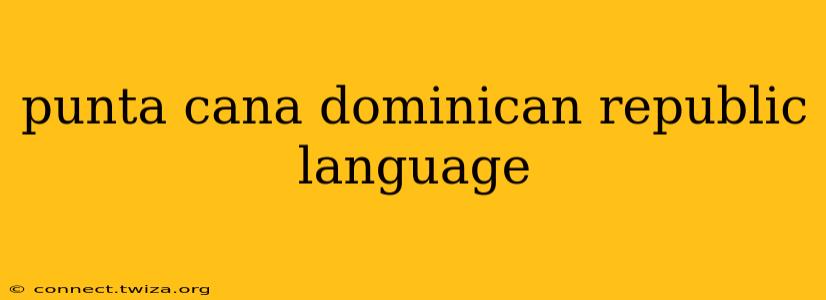Punta Cana, a vibrant tourist destination in the Dominican Republic, presents a unique linguistic landscape. While Spanish is the official language, English and other languages are commonly spoken in tourist areas. Understanding the local language nuances can significantly enhance your travel experience. This guide delves into the languages spoken in Punta Cana and offers tips for communication.
What Language is Spoken in Punta Cana?
The official language of the Dominican Republic, and therefore Punta Cana, is Spanish. However, due to the significant tourism industry, English is widely spoken, particularly in hotels, resorts, restaurants, and tourist attractions. You'll likely find staff members who are fluent or at least conversational in English, making communication relatively easy for English-speaking visitors.
Are there other languages spoken in Punta Cana?
While Spanish and English dominate, you might encounter other languages spoken by both residents and tourists. French, German, and Italian are sometimes spoken, particularly in upscale resorts catering to international clientele. However, Spanish remains the primary language used for everyday communication among locals.
How much English is spoken in Punta Cana?
The level of English spoken varies depending on the location and context. In tourist hotspots, English proficiency is generally high, with many individuals capable of holding basic to advanced conversations. Outside of these areas, English proficiency may decrease. Learning a few basic Spanish phrases will always be beneficial, regardless of the level of English spoken.
Is it necessary to learn Spanish for a trip to Punta Cana?
While not strictly necessary, learning some basic Spanish phrases will undoubtedly enrich your Punta Cana experience. It allows for more genuine interactions with locals, helps you navigate beyond tourist areas, and shows respect for the local culture. Even simple phrases like "Hola" (hello), "Gracias" (thank you), and "Por favor" (please) go a long way.
What are some useful Spanish phrases for Punta Cana?
Here are a few essential Spanish phrases that will prove helpful during your trip:
- Hola: Hello
- Buenos días: Good morning
- Buenas tardes: Good afternoon/Good evening
- Buenas noches: Good night
- Gracias: Thank you
- Por favor: Please
- Sí: Yes
- No: No
- Perdón: Excuse me/Sorry
- ¿Habla inglés?: Do you speak English?
- ¿Cuánto cuesta?: How much does it cost?
What is the Dominican Spanish dialect like?
Dominican Spanish, while mutually intelligible with other Spanish dialects, possesses its own unique characteristics, including vocabulary, pronunciation, and intonation. You may notice variations in accent and word usage compared to other Spanish-speaking regions. These differences add to the cultural richness of the experience.
By understanding the language landscape of Punta Cana, you can better prepare for your trip and enhance your interactions with the local community. While English is widely spoken in tourist areas, learning a few basic Spanish phrases will demonstrate cultural sensitivity and greatly enhance your overall experience. Remember to be patient and respectful, and enjoy the vibrant culture of Punta Cana!
